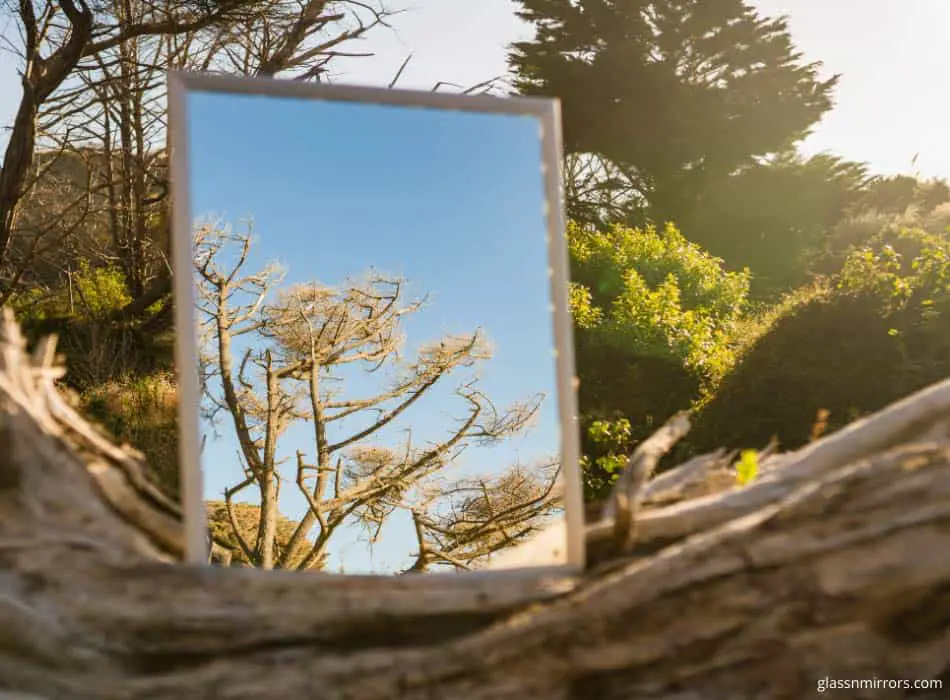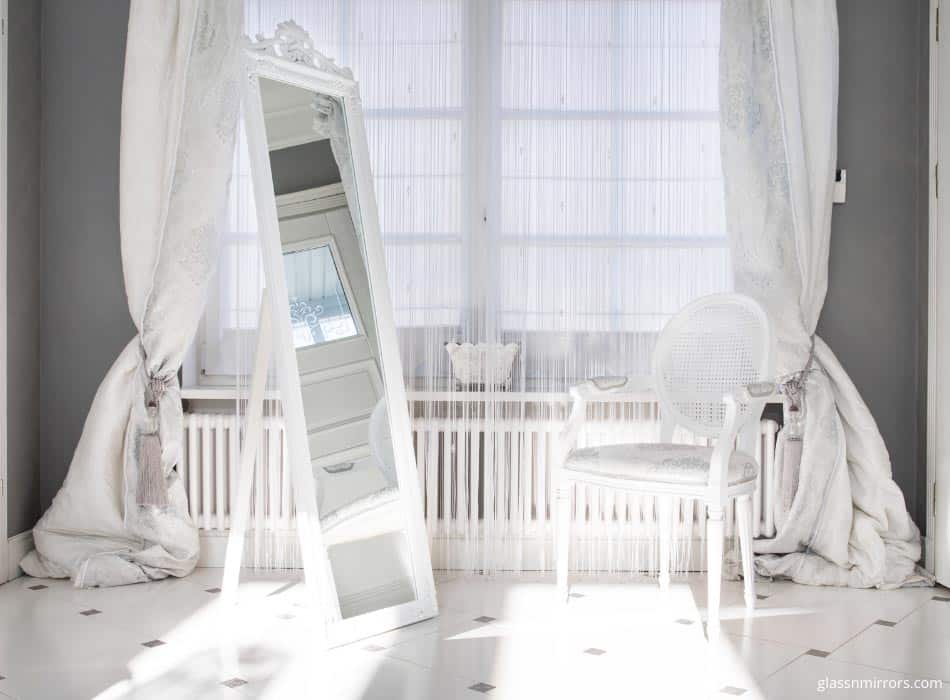If you are assessing the temperature of a room, you might be wondering what components of the room alter the temperature. Obviously, things like open windows make rooms cooler, but can other aspects in the room – besides actual heaters – make things warmer? Do mirrors reflect heat?
Mirrors do reflect a small amount of heat, although they do not reflect as much as they reflect light. A bright sunbeam would appear bright in a mirror, but the reflected light would not be very hot. The glass also absorbs some of the heat, reducing the amount left to reflect back.
Table of Contents
Do Mirrors Reflect The Sun’s Heat?
Mirrors, like most surfaces, do reflect some heat. The heat rays (infrared rays) will bounce off the shiny surface and be reflected out into the room, so any sun hitting the mirror does increase the temperature in the room to a degree. However, this is not as warm as the direct sunbeam.

If you put your hand in front of a sunbeam, you can feel the heat on your fingers – not surprisingly. If you put your hand in front of a sunbeam that is bouncing off the surface of the mirror first, you are unlikely to feel much. The heat is there, but it is massively decreased for a number of reasons.
Why Is The Heat Decreased?
Let’s explore why reflected heat does not feel so strong:
- Firstly, mirrors do not reflect as much infrared light as they do normal rays of light, so while the light’s intensity might be similar, the temperature will not be.
- Secondly, mirrors refract light. They spread it out, and that means that both the light and the heat will be somewhat reduced by the mirror. Often, it’s hard to see in a sunny room, but if you shine a bright torch on a mirror in a dark room, you may be able to observe this.
The mirror will reflect the light, but it will spread it out and the beam will be weaker where it bounces back into the room. If you put your hand in the glow, you should be able to see how much weaker the reflection is.
Likewise, the temperature of a refracted sunbeam will be lower, and you won’t feel much heat from the mirror, even if the sunbeam is pretty hot. The heat is being spread out more and is, therefore, harder to detect because it is less concentrated.
- Thirdly, mirrors absorb some heat themselves. If you touch the surface of the mirror, you will probably be able to feel how much warmer it is in the sunbeam than in the surrounding area. That’s because the glass is absorbing the heat, and not all of it is being bounced back into the room.
You would feel a similar effect if you touched almost any other object that has been left in the sun. Some of the sun’s heat gets absorbed by the object and warms it up.
Overall, then, mirrors do reflect the sun’s heat, but it is significantly reduced in the reflection and you may not be able to feel it just by putting your hand into the reflected sunbeam.
Can a mirror break in the cold? Read my article to find out.
How Does Heat Reflection Work?
Why do mirrors reflect heat? Well, they reflect light. Heat and light are both kinds of energy, but they don’t behave in the same ways. How well a mirror bounces back infrared light (heat) depends on the mirror and how perfect it is. Its ability to refract infrared light determines its ability to reflect heat.
The light from the sun is made up of heat and light, although we can only see a limited amount of the colors in it (that’s the spectrum that is visible to you when you look at a rainbow) and we can’t see the color that makes heat.
The red light with long waves that are redder than our eyes can see (infrared light) is the heat you can feel, and this makes up more than half of the sunlight. If our eyes were capable of detecting infrared, we would be able to see the heat of the sun as well as feel it.
This would apply to other heat sources too. If you could see infrared, you would be able to see the heat coming off a campfire, as well as the heat coming off your cooker. That sounds like it would be pretty useful, but it isn’t something that humans can do without special equipment.
When the infrared hits the mirror, the mirror bounces some of the infrared back. How much depends on how perfect the mirror’s surface is. The more perfect the surface, the more heat will be reflected.
Do mirrors have any delay? I wrote a full explanation here.
Do Mirrors Make A Room Hotter?
As a general rule, a mirror can make the room hotter, but you are not likely to notice this heat increase very much, even in summer. A mirror will absorb most of the heat before it reflects it.
That’s because the heat is likely already coming through your windows, and the mirror bouncing a bit back probably won’t make a big difference to the temperature in the room. Remember, the mirror will absorb some of the heat itself.

Think of this in terms of other surfaces too. If, for example, the sun coming through a window hits a black wall, you know that the wall will heat up noticeably, because it is absorbing the heat. If it hits a white wall, however, the wall will stay a bit cooler.
Some heat will still be absorbed, but significantly less. The rest will be bounced back into the room.
Similarly, the mirror will get a little warm, but it won’t get as hot as some surfaces.
If the mirror was perfect for every wavelength, it would reflect all of the heat back and absorb none, but this is highly unlikely.
Does the room get hotter as a result of the mirror? Not really, no. The mirror might be bouncing heat back into the room, but if it absorbed this heat instead, it would eventually release it back into the room as temperatures equalized.
A mirror won’t make your room hotter, therefore. The heat is already there. A surface that was absorbing it might emit more in a different direction (e.g. stones might suck the heat away rather than releasing it back into the room), but on the whole, the temperature will equalize with time, even if the mirror is emitting the heat.
So, if you were thinking of taking your mirrors down this summer, I don’t think you need to worry. However, be wary of magnifying mirrors, as these can focus the light rays and could cause a fire risk. Too much-focused light might make a flammable object catch fire.
You should always cover a magnifying mirror when you are not using it, to reduce any risk of this occurring.
Many people think mirrors make you look bigger. I wrote the real truth about this.
Does A Mirror Produce Heat?
Mirrors do not produce heat. Mirrors have no energy transfer that could create heat; they are simply reflective surfaces from which the light will bounce. Infrared rays may be reflected off, but mirrors don’t have any means to make heat themselves.
Having a mirror in your home should not make it any hotter than it already is, so don’t worry about this. You can close the curtains or cover up the mirror if the refracted heat is proving problematic, but otherwise, don’t worry about your mirror in relation to the temperature in your home.
Unless a mirror has batteries or some other power source, it can’t make heat. Directing heat into it should result in heat loss overall because it will absorb some of the heat and release it in another direction.
If, for example, you were to put a heater facing a mirror, it would not make the room hotter as a result. Instead, the heater would heat the mirror, which would reflect some of the heat back, and absorb some of the heat. Likewise, if the sun shines on the mirror, it might refract the infrared rays, but it cannot produce heat independently of the sun.
I have a mirror on one of the walls of my bedroom, half-facing the windows, and another on the opposite wall, which directly faces a window. Neither mirror makes a noticeable difference. The direct-facing mirror gets morning sun, while the opposite one gets late afternoon sun.
The mirrors reflect the light back and make the room brighter, but they don’t make any difference to the temperature in the room as far as I am aware.
To produce heat, the mirrors would have to be exchanging energy in some way, and they aren’t doing this. They are static objects and cannot generate warmth themselves.
Does Mirror Glass Reflect Heat?
There is mirror glass that is designed to reflect the heat and bounce it away from your home. Many people have started looking at this as an option for cooling down their homes and offices and reducing their dependence on air conditioning – which is not very environmentally friendly.
Mirror glass can reflect heat just like a mirror can provide it is in a position to reflect the sun. You can purchase a mirror glass film from many different companies, and this is specifically designed to both block and deflect the sun’s rays, keeping the room much cooler as a result.
You can even buy film that can be applied to your windows. This is often designed to block light, but there are options for blocking out heat, too, and some of these can block a very high percentage of infrared rays. There are a few options that can block over eighty percent.
Obviously, this helps to keep your home warm in the winter and cool in the summer, because it reduces the heat exchange. It isn’t just blocking the sun’s rays, either; it can bounce the heat back into the room, rather than just stopping it from coming through via the sun’s rays.
How Much Heat Can A Mirror Take?
A mirror can take temperatures of in excess of 300°F and even higher without cracking or breaking. Mirrors usually break due to sudden variations in temperature.
If you need a mirror that is able to withstand high temperatures, you may wish to find a stainless steel option, as these have better heat resistance and will not be easily damaged by heat absorption.
For kitchen splashbacks, mirror or glass gets toughened which enables it to take more heat and knocks from saucepans.
The mirror will reflect some heat, but will also absorb some, and it needs to be tough enough to cope with this absorption. Like I said earlier, mirrors generally get affected by sudden changes in temperature, not the amount of temperature.
Similarly, a mirror placed behind a radiator or fireplace with the intention of directing heat back into the room needs to be strong enough to handle the conditions.
Rather than breaking, a mirror
can warp in excessive heat situations.
Standard mirrors will not usually have a problem when exposed to sunlight, but they might not cope with being close to a fireplace. If you want to hang a mirror above or behind a fire, you will need to consult the manufacturer’s information to understand whether this is safe or not.
Many mirrors are treated to be able to withstand extremely high temperatures, but this increases the production (and therefore purchase) costs, and it is only done for mirrors that need to be able to handle heat effectively.
Conclusion
So, the answer to “do mirrors reflect heat?” is a yes, they do. Some mirrors reflect more heat than others, depending on their ability to bounce infrared light back into the room, but all mirrors will reflect some heat and some will reflect a lot.
Remember, however, that they also diffuse the heat so it is harder to feel if you just put your hand in the reflected beam.
